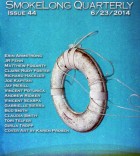There is a sense of a fearful man who doesn’t take chances and doesn’t live a large life, and thus has many regrets. The fact that the section “Had you been a better father” isn’t actually included, though there are several references to it in this piece, gives the impression of a much longer list. How long is this character’s sense of regrets?
I don’t see his regrets as stemming from a set of careful/safe/unadventurous life decisions as much as they are provoked by his wife’s accident. It’s common, I think, to return post-tragedy to an almost childlike set of butterfly effect-ish questions: if only I had put on my turn signal, if only I had left the house two minutes earlier, if only I had made eggs instead of pancakes, I would have avoided that car crash… He’s trying to out-think his grief. The regrets are as many as every choice in life that he didn’t make, that didn’t leave him in mourning.
Many of his regrets aren’t obviously (to the reader) related to his wife’s accident, and I’m wondering how they are tied together in his mind. Or are they?
The story follows a sort of grief-induced illogic where everything relates to the loss of his wife. Flossing would put him in better physical condition, which in turn would make him healthier, which in turn would make him more health-conscious, which in turn would prompt him to swim more, which in turn would make him go to the lake house, and maybe then he could have saved her… It’s the impossible fantasy that there is some golden set of choices that keeps you immune to sadness, heartache, etc.
Is there still time for him?
Though he is effectively blameless for his wife’s death, there is still time to redeem himself in other ways. To be a better parent, for one thing. To improve himself in the aftermath of tragedy.
Can you say something about Privacy Policy? What is Surveillance Poetics?
Privacy Policy is a project I am incredibly excited about. Forthcoming from Black Ocean this summer, it’s an anthology of contemporary poems (many of which are brand, brand new) on the topic of surveillance. There are 60+ contributors including Robert Pinsky, Jorie Graham, John Ashbery, Rae Armantrout, Nikki Giovanni. It’s a powerful artistic response to a pressing issue of our times.
What is one piece of advice about writing flash you might offer?
Flash presents the chance to experiment with form in a way that could (potentially) grow tiresome if stretched over the duration of a novel or even a conventional short story. Fortune cookies, song lyrics, diary fragments—anything is fair game.



 The SmokeLong Grand Micro Contest (The Mikey) is now an annual competition celebrating and compensating the best micro fiction and nonfiction online.
The SmokeLong Grand Micro Contest (The Mikey) is now an annual competition celebrating and compensating the best micro fiction and nonfiction online.